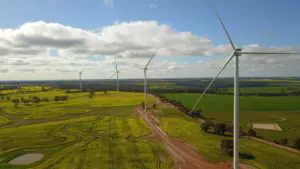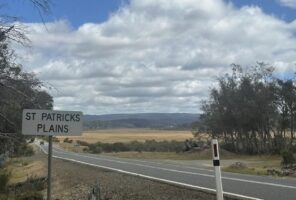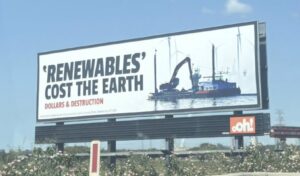“News Showcase is a product for public interest journalism, so there may not be a great fit.”
And with one short email from the Singapore-based head of Google News for the Asia-Pacific region to RenewEconomy management, rejecting our request to even hold discussions with the company, the full catastrophe the Coalition government’s new media bargaining code could represent for media diversity in Australia became apparent.
RenewEconomy has spent nearly a decade reporting on climate policies and the clean energy transition, the two dominant themes of the 21st Century that have deep economic, environmental and health impacts for everyone. We have held politicians, regulators, institutions, and the renewables industry to account, and built up a sizeable following in the process – more than 20 million page views across its publications in 2020.
If this is not public interest journalism, what is?
Google is getting to decide and among those chosen for its new Google Showcase, and getting paid to be there, is the youth-focused website Junkee. Its lead story on Wednesday: “Was Joss Whedon the real big bad of “Buffy”.” Its number 2 story: “We reckon we’ve worked out who cheats on MAFS this season.”
Also on Google Showcase, and reportedly getting paid millions by Google to feature on its “public interest” news platform, is News Corp and its toxic Sky News Australia, the source of the kind of lies and misinformation that RenewEconomy has been debunking for years.
It seemed no coincidence that last week, as Ketan Joshi has reported, the top rating story on Google for “solar news” was this piece of invention from Sky News Australia, falsely claiming the failure of German renewables during a cold winter front. It was a story that contained not a shred of evidence. It sat on the top of the Google search for solar news for four days.
Is this the future of journalism in Australia? We hope not, but it doesn’t bode well. But before we contemplate that any further, let’s recall how we got here.
The Coalition government announced some time ago its plans for its “Media Bargaining Code”, apparently under pressure from News Corp. News, and other big media players – Seven, Nine and the Guardian among them – claimed that their content was being “stolen” by internet giants Google and Facebook, and they demanded that the government introduce a law that required them to be paid for their journalism.
Of course, as the likes for Crikey have pointed out, this claim is nonsense. If the big media companies really didn’t want links to their stories to appear on Facebook, they could have started by removing the pages they have built on that platform. If they didn’t want their stories to be found on Google, a simple line of code – just a few minutes work – would have done the trick.
They didn’t do that because they benefited so much from the traffic sent their way by the social media giants, and the income they earned. What this is, as Crikey has noted, is effectively a government mandated shakedown of “big tech” by “big media” under the cover of supporting public interest journalism. Or “hush money” as Michael West Media describes it. It appears mostly designed by big media to line their own pockets and protect their prime positions in the media landscape.
And what was once claimed to be a fillip to media diversity has turned – predictably and disturbingly – into the opposite. Google will choose who it wants to be on Showcase. Facebook says it is creating a similar platform, but has made clear it will only “support the publishers we choose to.”
On what criteria are these decisions being made? Who defines the public interest? What happens to the smaller publishers who are not the chosen ones? Does Showcase and Facebook News now mean that those publications paid by Google and Facebook will get priority over others?
Will the social media reach and readership of web-sites like RenewEconomy be diminished because of this? Will our content now be harder to find? If it doesn’t have this impact, then what is the intent of the showcase? Is it just a pretence?
Will Google and Facebook still be required to make payments for links for all media? Neither company seems to think so, and Facebook’s statement makes it clear it won’t, it will just sign up enough to please the Treasurer. And if the Treasurer isn’t pleased, then the news feed will be blocked again.
But, again, we ask: Under what criteria are these decisions being made?
We don’t know the answer to any of these questions. Nobody seems to know. And the ability of Facebook and Google to recognise and understand public interest journalism – fundamental, it would seem, to the new code, is questionable.
After Ketan Joshi wrote about the Sky News post, and how it was promoted by Google, he found a way to link to the story from Facebook. But his take-down of the Sky News nonsense, and Google’s role in promoting it, was quickly labelled by Facebook as “false information”.
(This was likely done by a machine that recognised a fake image published by Sky News that Joshi had used to highlight the fake news. The link provided by Facebook explaining why Joshi’s post had been labelled “false information” went to an AFR “fact check” that actually supported his story. But the damage was done).
So, if neither Google nor Facebook can recognise what public interest journalism is, or what is true or false information, then how can this code be claimed to protect it?
Treasurer Josh Frydenberg and communications minister Paul Fletcher crowed on Thursday – after the News Media and Digital Platforms Mandatory Bargaining Code passed through parliament – that it would “sustain public interest journalism” and they were actually pleased that deals had been struck by Google and Facebook with their chosen media companies.
“Our commitment to legislating the Code reflects the importance of a diverse and well-resourced news media sector to our democracy and the Australian people,” they said.
There is a strong case to support public interest journalism in Australia, but this is not the way to do it.
As Chris Warren, formerly the head of the media union, wrote in Crikey: “Australia has ended up with the worst possible deal — one that strengthens both old media and big tech monopolies, particularly their most socially malign elements in News Corp and Facebook.”
This could prove to be a disaster for public interest journalism in Australia, and may lead to the perverse outcome of protecting big media, rather than leaving it open to more competition.
As Crikey notes, it could have a devastating impact on smaller publications. Even the Media union, the MEEA, has finally woken up to this possibility and the implications of media being left at the mercy of Facebook and Google as they seek to avoid mandatory regulation and choose which media companies they come to agreements with.
“This will particularly affect small publishers if the Treasurer deems that Google and Facebook have done enough not to be named as respondents to the News Media Mandatory Code,” the MEEA said.
“For small publishers who fail to make side deals with the tech giants, they could be locked out, further entrenching the narrow ownership base of the Australian media market.”
A government like Morrison’s could hardly have wished for a better outcome. The core of their supplicant media is to receive millions to continue on their cheering from the sidelines, independent voices such as RenewEconomy risk being squeezed by the nature of these secret deals and decisions, even as big media companies and the competition regulator claim this to be some sort of victory for media diversity and the democratic process.
It risks being nothing of the sort. As it stands, it’s astonishing, it’s dangerous, and it’s demoralising. From where we sit, it’s bad for climate and it’s bad for the clean energy transition – the great challenges of our time. And it’s bad for democracy.










